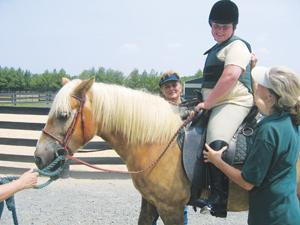 |
|
Golden Dreams Program Offers Opportunities for Special Ridersby KRISTEN ARMSTRONG, Staff Writer
|
|
| Everyone has hopes and dreams,
and the staff at the newly opened Golden Dreams Open Equestrian program
at Baileywyck Farm in Middleburg strive to make some of those dreams
come true for riders with special needs. Riding lessons at Golden Dreams began in mid-June, and the program has been reaching people with disabilities, of all ages, and helping them attain their riding and therapeutic goals. Riding helps those with physical disabilities in flexibility, balance and muscle strength. For riders with mental or emotional disabilities, working with a horse can lead to increased confidence, patience and self esteem. The focus at Golden Dreams isn't on the riders' disabilities, but on how they can learn to ride and love horses just like anyone else. “What makes us different is we're an open equestrian program,” said executive director Carina Elgin. “We don't want people with disabilities to think it's just therapy. This is where people can learn from each other.” The goal of the Golden Dreams program is to show how people of all abilities have more in common than not, Elgin said. The program includes open riding lessons, field trips for special needs groups, and awareness field trips and workshops for schools. One aspect of the program that staff are particularly excited about is para-equestrian training, designed for those who have physical disabilities but can ride independently. Para-equestrians participate in dressage shows alongside non-disabled riders. They can compete in local, state, national and international competitions. “We are proud to provide the opportunity for people with disabilities to train and compete in dressage,” program manager and internationally recognized para-equestrian coach Dada Suvak said. “We strongly believe that's the way to include people with disabilities.” Currently, there are 12 riders in the Golden Dreams program, and each has a personalized riding plan. Progress is monitored by the instructors at each lesson, and progress reports are available for the riders, as well as parents and physicians. Instructors are all certified by the North American Riding for the Handicapped Association. “We find out if [the participants] have ridden before, learn about their history of medical issues, then we capitalize on their strengths and use lots of positive reinforcement,” instructor Kate White said. “One of our emphases is to transport riders to the same place everyone else goes on their horses. Whether you have cerebral palsy or autism, all those things are completely invisible. The horse doesn't know.” Although Baileywyck Farm owners Lisa and Allen Iantosca don't ride, they were committed to making the program a reality. “I've fund-raised my whole life, and everything clicked with this program,” Lisa Iantosca said in a recent interview. “I just know how therapeutic animals are.” Currently the program has about 20 volunteers, but more are always welcome. Iantosca hopes to raise enough money in the next few months to make the program year-round. So far, response from program participants has been positive and almost all have signed up for the eight-week riding package. “Our main goal is to achieve a sense of success for everyone here, and make this a place where they can realize their golden dreams,” coach Suvak said. |
 Golden Dreams executive director Carina Elgin's daughter, Caroline, enjoys her riding lesson with instructors Dada Suvak and Kate White. (Photo by Kristen Armstrong) |